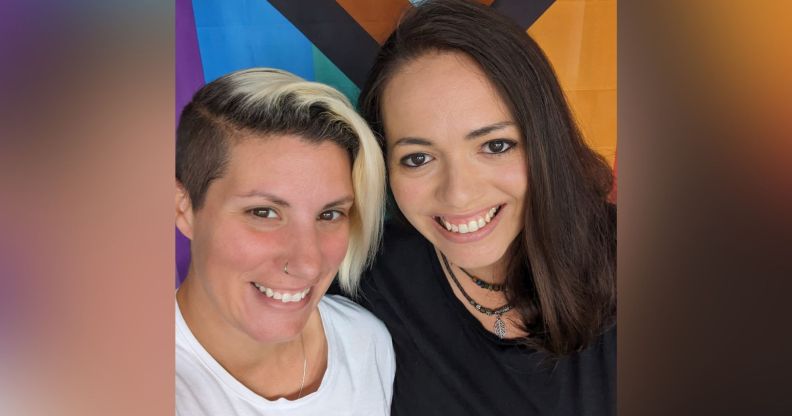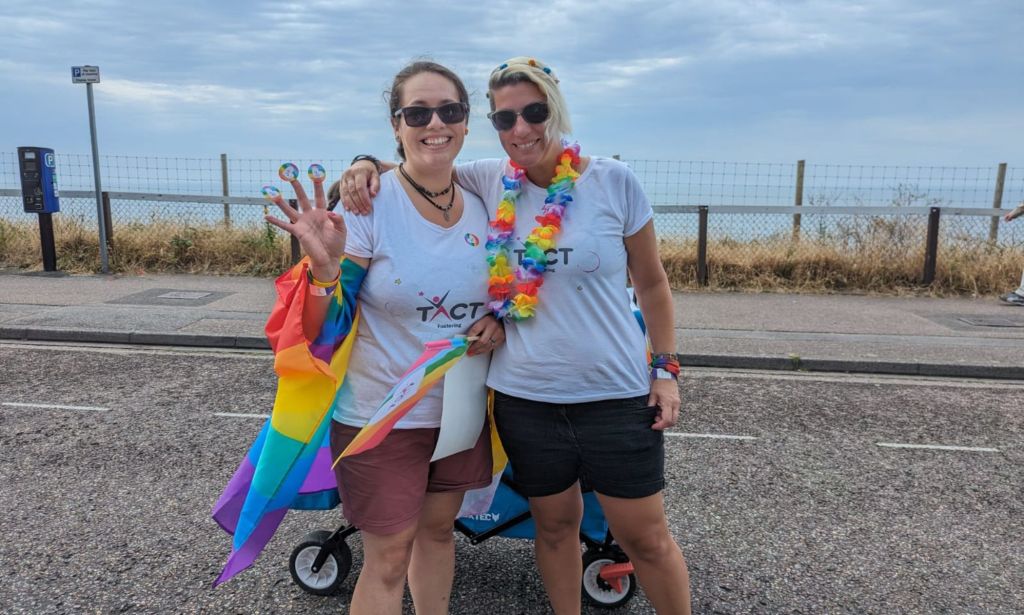LGBTQ+ couple open up about the ‘learning curve’ and joy of being foster carers

Nat and Terri, an LGBTQ+ couple from Dorset, have found immense joy in being foster carers. (Supplied)
Nat and Terri, an LGBTQ+ couple from Dorset, have found immense joy in being foster carers. (Supplied)
Within the first couple of months of being together, LGBTQ+ couple Nat and Terri discussed how to expand their family as foster carers. Over the past five years, they’ve helped the young people they foster let go of “fears and anxieties” – and just be kids.
Nat knew for quite a long time that she wanted to be a parent, but she wasn’t too focused on “the way, the which, the how” she became a mum. She wanted to be somebody who “would help the next generation” grow.
But it was her partner Terri, a teacher, who brought up the idea of fostering.
“I’d always wanted to raise a family,” Terri tells PinkNews. “But I was also very aware, from quite a young age, that there are so many children in the UK in need of a family.
“And I felt, for me, I didn’t need that biological tie to a child to consider them as my child.
“So I’d kind of come to the decision even before I met [Nat], that it was the route I wanted to take, and I taught in some schools where there were really high levels of children who were either in or on the edge of care.
“So I just always knew that was kind of the path that I’d be taking.”
Over the years, the couple’s conversations about having a family circled back to fostering. While doing their research on fostering, they moved into a flat together which was almost directly opposite the head office of TACT (The Adolescent and Children’s Trust) – the UK’s largest dedicated fostering charity – in London.
Nat says the couple attended a TACT stall at a local event where they “reeled off” their list of questions – and their fostering journey began in earnest. They began the process of getting approved and moved into a new home where their landlord was supportive of them fostering.
Nat says it was like the “stars aligning”.
“We were approved,” she told PinkNews. “Then, we had one month, and then all of a sudden we had two children.

“It was such a shift because at that time, there was a baby. We had never cared for a baby, and they had an older sibling. We got three days in, and then we’re like, ‘Have you showered? Have I showered?’
“It’s such a learning curve. I think any parent, you almost go through this period of preparation, but you don’t know until you live and experience it.”
Over the past five years, the LGBTQ+ couple have looked after a baby, siblings and teens as foster carers.
Through it all, Terri says one of the biggest joys has been seeing the children they foster get to finally be kids.
“They come with so much fear and so much anxiety, and they come with so many unknowns attached to them and within them as well,” she says. “They don’t know what’s going on half the time.
“We don’t know what’s going on for them in the long term because nobody does, because that plan hasn’t been written at that point.”
She says that seeing the children “start letting go of a lot of the fear and anxiety” is incredibly rewarding.
There was a moment, Terri explains, about four or five days in, when the couple took their eldest foster child to the local park.
“She just wanted to go backwards and forwards on that zip wire,” Terri says. “It was that release of going, ‘You know what I’m a child, and I need this’ and being able to give those fears and anxieties to us, and to trust us to hold onto those while they get busy with the business of being a little kid.”
LGBTQ+ foster carers are needed as the number of children in care in England grows year on year
In 2022, the number of children looked after by local authorities in England rose to over 82,000, up two per cent in 2021 and almost three per cent from the year before.
This rise has been tracked by the Department for Education in recent years as the government, charities and local authorities grapple with dwindling resources.
There is no typical foster carer, and it’s a journey that can be rewarding to anyone who feels the calling. Queer couples and single LGBTQ+ people are needed as foster carers to provide stable and loving homes for children and young people who can’t live with their own families.
Nat says every child “has a different background” so people from all backgrounds – including ages, sexualities, ethnicities, family types, working or retired – are needed to step forward to provide young people with the care they need to flourish.
Through both success and hard times, she says there’s “always support” in the form of groups offering advice and making sure “you’re not on your own in isolation”.
“Like within TACT, we’ve got our Pride network,” she says. “We’re an open network for any foster carer, even if they’re not within our community [or] if they’re allies.
“They can approach us with any questions because they might end up with a child who is in the community.”
Any LGBTQ+ folks and others interested in learning more about becoming foster carers can contact TACT via their website.

